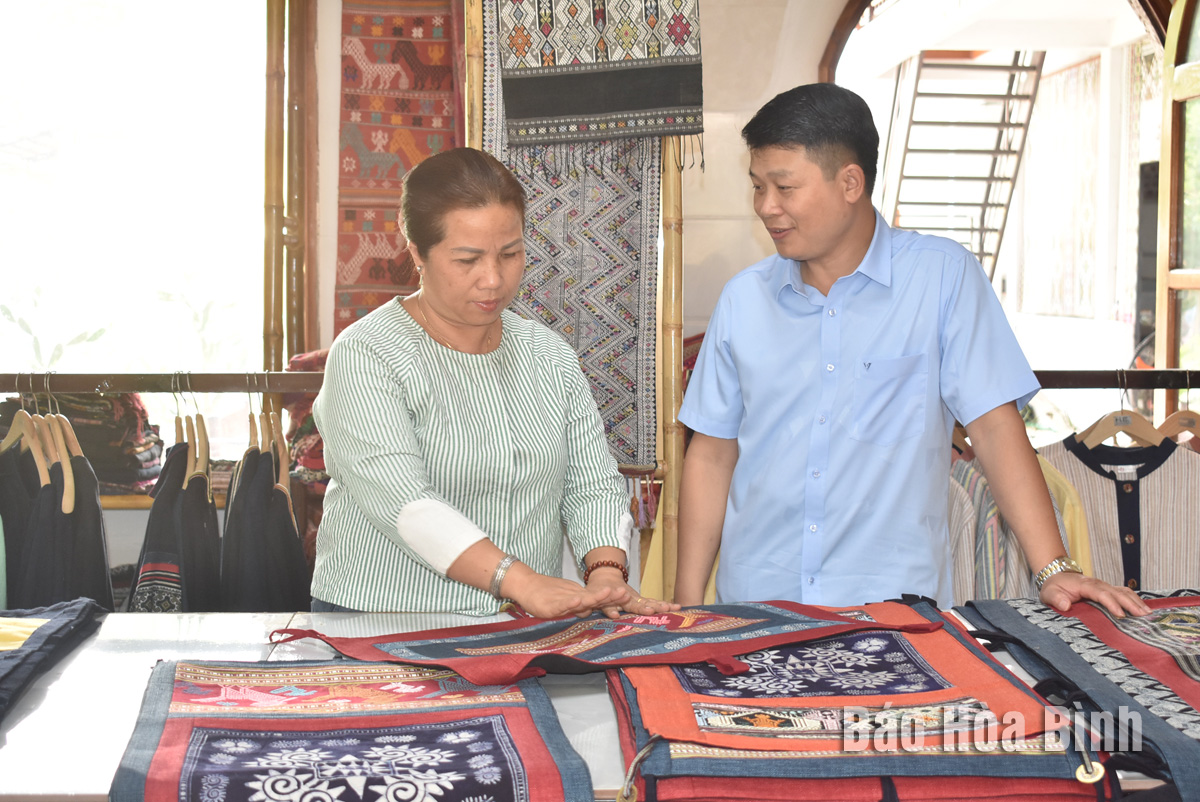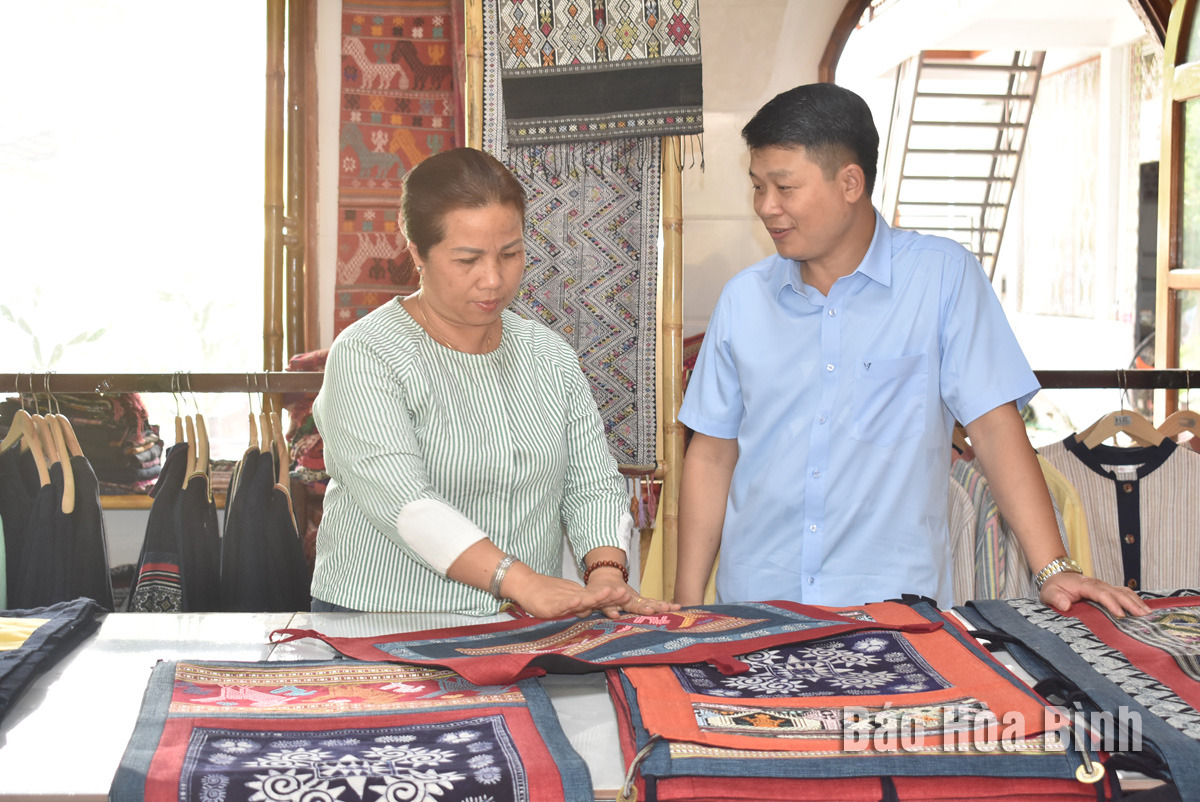
In recent years, the cooperative economy in Hoa Binh province has made significant progress, particularly in the agricultural sector. This development has contributed not only to local economic growth but also to improving livelihoods, promoting rural development, and protecting the environment.
Products of the
Hoa Ban Cooperative in Chieng Chau commune, Mai Chau district, have won
consumer preference in domestic and foreign markets.
Focusing on high-quality agricultural products, the Pham An Agricultural
Production and Consumption Cooperative in Tram hamlet of Hung Thi commune, Lac
Thuy district, has successfully produced and supplied safe vegetables, fruits,
and root crops for major markets in northern Vietnam.
With over 70 hectares of cultivated land, the cooperative recently signed an export
contract with the T9 Vietnam company to grow five hectares of bird’s eye chili
to supply for the Republic of Korean market at 20,000 VND (0.78 USD) per
kilogram of fresh chili, with a plan to expand the area to 10 hectares.
Director Pham Van Toan said the cooperative has created safe and trusted
products to gain consumer trust, serving as a bridge between farmers and
businesses, ensuring stable market access.
The Luong Phu Agricultural Services Cooperative in Tan Lac district,
gathering13 members, operates in agriculture and handicraft production. In
2020, it partnered with a company making handmade thatch products, which trains
cooperative members and guarantees product purchases. This initiative has
provided stable incomes for members, created jobs for hundreds of farmers, and
supported disadvantaged households, according to Director of the cooperative
Nguyen Thi Bay.
To further promote cooperatives, the provincial Party Committee has implemented
Resolution No. 06-NQ/TU, issued in 2021, to encourage individual businesses and
enterprises to join cooperatives, along with an action plan to carry out the
Prime Minister's Decision No.340/QD-TTg, which approved the strategy for
developing the collective and cooperative economy for 2021 - 2030 . Additionally,
conferences have also been held to disseminate legal regulations on the
collective economy to 2,100 participants, including local officials, Party
members, and cooperative members, and hosted multiple policy dialogues.
Market expansion efforts have also intensified. The province has worked to
allocate part of funding from the three national target programs to support
the development of the collective economy. Assistance has focused on helping
cooperatives take part in trade promotion events and distribute products
through e-commerce platforms.
In 2024, the
Cooperative Alliance of Hoa Binh province assisted four cooperatives in
displaying products at the CoopStar Awards and the National Cooperative Forum.
Besides, three cooperatives were helped to showcase products at the 16th
provincial Vietnam Fatherland Front Congress while many others participated in
major trade fairs across Vietnam and the Vietnam-China Friendship Fair. These
initiatives helped cooperatives secure new orders and expand their market
reach.
Last year, the
province also proposed the Vietnam Cooperative Alliance recognise exemplary
products of local cooperatives such as the lemongrass essential oil of the
Thong Nhat Cooperative; solanum procumbens extract of the Tuyet Nhi Cooperative,
and the red-fleshed pomelo of the Tan Lac Red-Fleshed Pomelo Cooperative.
The provincial Cooperative
Alliance said it will continue to disseminate the policies supporting
cooperative economy development, improve the collective economy governance, and
strengthen linkages with enterprises. Efforts also focus on integrating
cooperatives into sustainable supply chains, increasing access to finance, and
recognizing outstanding products.
With strong support from all-level authorities, efforts by cooperatives and
farmers, as well as the effective implementation of support policies, Hoa
Binh’s cooperative economy is set to develop sustainably, thus improving
people's life quality and driving economic progress.
According to data from the Hoa Binh Provincial Party Committee, the industrial production index for the first six months of 2025 is estimated to have increased by 20% compared to the same period last year. This marks the highest year-on-year growth rate for this period since 2020.
In the first six months of 2025, Hoa Binh province’s export turnover was estimated at 1.145 billion USD, marking an 18.11% increase compared to the same period in 2024. Import turnover was estimated at $ 804 million, a 17.15% increase, which helped the province maintain a positive trade balance.
The lives of the ethnic minority farmers in Tan Lac district have gradually improved thanks to the new directions in agricultural production. This is a testament to the collective strength fostered through the professional associations and groups implemented by various levels of the district’s Farmers’ Union.
With the motto the "product quality comes first,” after nearly one year of establishment and operation, Muong village’s Clean Food Agricultural and Commercial Cooperative, located in Cau Hamlet, Hung Son Commune (Kim Boi district), has launched reputable, high-quality agricultural products to the market that are well-received by consumers. The products such as Muong village’s pork sausage, salt-cured chicken, and salt-cured pork hocks have gradually carved out a place in the market and they are on the path to obtaining the OCOP certification.
In the past, the phrase "bumper harvest, rock-bottom prices" was a familiar refrain for Vietnamese farmers engaged in fragmented, small-scale agriculture. But today, a new spirit is emerging across rural areas of Hoa Binh province - one of collaboration, organisation, and collective economic models that provide a stable foundation for production.
Maintaining growing area codes and packing facility codes in accordance with regulations is a mandatory requirement for agricultural products to be eligible for export. Recently, the Department of Agriculture and Environment of Hoa Binh province has intensified technical supervision of designated farming areas and packing facilities to safeguard the "green passport" that enables its products to access international markets.



